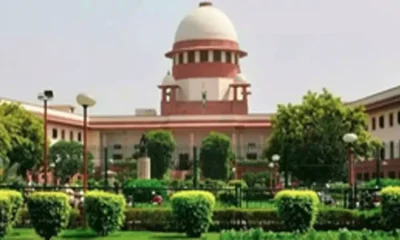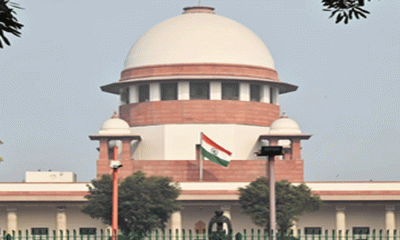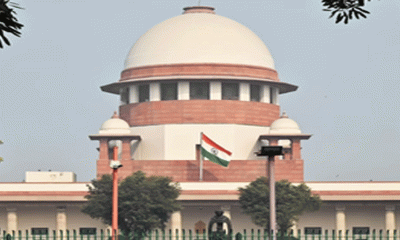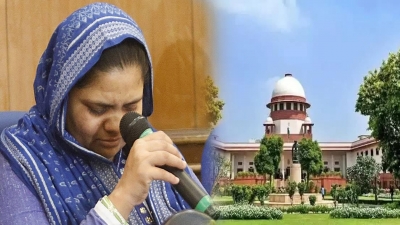National News
Not mandatory for ED to supply ECIR, disclosing ground of arrest enough: SC
The Supreme Court on Wednesday said supply of a copy of Enforcement Case Information Report (ECIR) in every case to the person concerned is not mandatory, while holding it is not equivalent to an FIR.
A bench, headed by Justice A.M. Khanwilkar and comprising Justices Dinesh Maheshwari and C.T. Ravikumar said: “Supply of a copy of ECIR in every case to the person concerned is not mandatory, it is enough if ED at the time of arrest, discloses the grounds of such arrest.”
The bench said in view of a special mechanism envisaged by the Prevention of Money Laundering Act (PMLA), the ECIR cannot be equated with an FIR. “ECIR is an internal document of the ED and the fact that FIR in respect of scheduled offence has not been recorded does not come in the way of the authorities referred to in Section 48 to commence inquiry/investigation for initiating ‘civil action’ of ‘provisional attachment’ of property being proceeds of crime,” it added.
It said the argument of prejudice pressed into service by the petitioners for non-supply of ECIR deserves to be answered against the petitioners. “For, the arrested person for offence of money laundering is contemporaneously informed about the grounds of his arrest; and when produced before the Special Court, it is open to the Special Court to call upon the representative of the ED to produce relevant record concerning the case of the accused before him and look into the same for answering the need for his continued detention,” it added.
The petitioners’ counsel had argued that as per present situation, the ED can arrest an individual on the basis of an ECIR without informing him of its contents, which is per se arbitrary and violative of the constitutional rights of an accused. It was vehemently argued that in some cases, the ECIR is voluntarily provided, while in others it is not, which is completely arbitrary and discriminatory.
Senior advocate Kapil Sibal, representing one of the petitioners, while referring to the definition of “money laundering” under Section 3 of the PMLA, submitted that the ED must satisfy itself that the proceeds of crime have been projected as untainted property for the registration of an ECIR or the application of the PMLA.
The top court said that ECIR cannot be equated with an FIR which is mandatorily required to be recorded and supplied to the accused. “Revealing a copy of an ECIR, if made mandatory, may defeat the purpose sought to be achieved by the 2002 Act including frustrating the attachment of property (proceeds of crime),” it said.
It held that non-supply of ECIR, which is essentially an internal document of the ED, cannot be cited as violation of constitutional right. “This is compliant with the mandate of Article 22(1) of the Constitution. It is not unknown that at times FIR does not reveal all aspects of the offence in question. In several cases, even the names of persons actually involved in the commission of offence are not mentioned in the FIR and described as unknown accused,” it noted.
The bench said even, the particulars as unfolded are not fully recorded in the FIR, despite that, the accused named in any ordinary offence is able to apply for anticipatory bail or regular bail, in which proceeding, the police papers are normally perused by the court concerned.
It also noted that in some cases, the ED has furnished a copy of ECIR to the person before filing of the complaint. “That does not mean that in every case the same procedure must be followed. It is enough, if the ED at the time of arrest, contemporaneously discloses the grounds of such arrest to such person,” it said.
The top court noted that ECIR may contain details of the material in possession of the authority and recording satisfaction of reason to believe that the person is guilty of money laundering offence. “If revealed before the inquiry/investigation required to proceed against the property being proceeds of crime including to the person involved in the process or activity connected therewith, may have deleterious impact on the final outcome of the inquiry/investigation,” said the bench.
The ED had submitted that the ECIR is an internal document created by the department before initiating penal action or prosecution against the person involved with process or activity connected with proceeds of crime.
The top court judgment came on more than 200 petitions challenging various provisions of the PMLA.
Crime
Samrat Choudhary takes charge as Bihar Home Minister; warns criminals
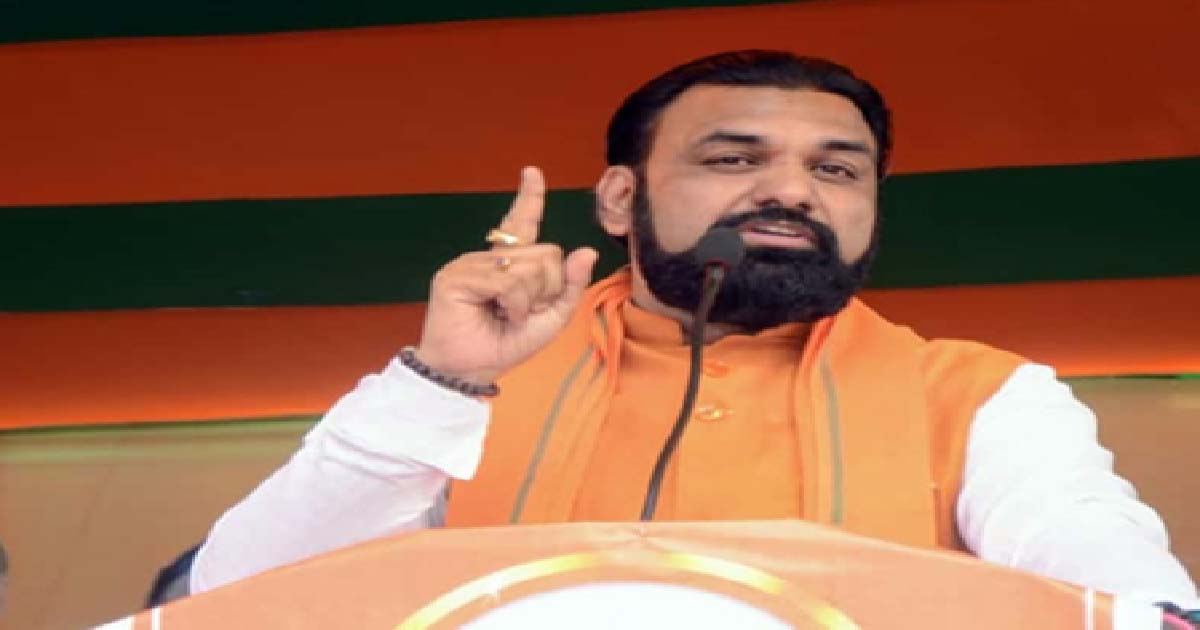
Patna, Nov 22: After becoming Bihar’s Home Minister, Deputy Chief Minister Samrat Choudhary has taken a tough stance on maintaining law and order in the state.
On Saturday, soon after assuming office, he issued a stern warning to criminals, declaring that no offender would be spared and that the police had been given full freedom to act.
Deputy CM Choudhary said that the police are no longer bound and now have complete authority to take action openly.
He reaffirmed that criminals have no place in Bihar and asserted that the Home Ministry will work under the guidance of Chief Minister Nitish Kumar.
Good governance, he said, existed earlier and would continue even more firmly in the future.
He added that the ‘jungle raj’ that had been eliminated would not be allowed to return.
Responding to a query about his earlier controversial remark — saying that criminals in Bihar would be cremated in Gaya — the State Home Minister said the police were doing their job.
This marks the first time Chief Minister Nitish Kumar has handed over the Home Department to the BJP since 2005.
In the new Cabinet, along with Nitish Kumar, 26 Ministers were sworn-in.
Samrat Choudhary has been appointed both the Deputy Chief Minister and Home Minister, while Vijay Kumar Sinha has also been appointed the Deputy Chief Minister of Bihar.
He is holding the charge of Revenue, Land Reforms and Mining departments in the Nitish Kumar-led Bihar government.
Ministers from all NDA constituents have found a place in the Bihar Cabinet.
The BJP has the highest representation in the state Cabinet with 14 Ministers, followed by Janata Dal-United with eight, Lok Janshakti Party-Ram Vilas with two, Hindustani Awam Morcha (HAM) with one, and Rashtriya Lok Morcha (RLM) with one.
Despite having two Deputy CMs and 14 Ministers, the BJP’s share of the allocated departmental budget is lower compared to JD-U.
The BJP controls 29.22 per cent of the total budget, LJP-RV Ministers 0.91 per cent, HAM 0.58 per cent, and RLM 3.56 per cent.
The remaining departments, accounting for around 65 per cent of the total budget, remain with the JD-U.
Crime
Palghar Crime: 3 Arrested For Attempted Murder And ₹10 Lakh Robbery In Vasai; Police Bust Interstate 6-Member Gang

Palghar, Maharashtra, Nov 22: The Crime Detection Unit (Unit 2) of the Mira-Bhayander, Vasai-Virar Police has arrested three men involved in an attempted murder and armed robbery at a residence in Vasai, recovering gold jewellery and cash worth ₹10 lakh.
The incident took place on November 18 when three unidentified men forcibly entered the home of 37-year-old Geeta Raut in Reliable Glory Building at Sativali, Vasai West.
The intruders threatened Raut and her son Santosh at knifepoint, demanding information about the location of their gold. When Raut said she did not know, one of the assailants attempted to stab her.
She managed to evade the blow but sustained an injury to her left arm. The attackers then broke open a cupboard and escaped with 12 tolas of gold ornaments and a mobile phone.
Following the registration of the case at Waliv Police Station, officials conducted a detailed investigation at the crime scene and surrounding areas.
Through technical analysis and intelligence from informers, the police identified the suspects and learned that they were residing in Nandagaon, Karnataka.
A team was immediately dispatched, and on November 20, three accused were detained along with 8 tolas of stolen gold, cash, and a mobile phone, collectively valued at ₹10 lakh. During interrogation, it was revealed that they were part of a six-member gang involved in the crime.
The arrested accused have been identified as Ashok alias Babu Raju Shinde, a resident of Shantinagar Dongripada in Vasai East originally from Nandagaon in Karnataka; Abdul Rauf Hashmi, a resident of Richard Compound in Manocha Pada, Vasai East originally from Jaunpur in Uttar Pradesh; and Ritik Ravi Belangi, also living in Richard Compound and originally from Nandagaon in Karnataka.
Police have also named three absconding accomplices: Nur Hasan Khan from Patil Wadi in Nalasopara East, Suraj Kishor Jadhav from Shantinagar in Nalasopara East, and Kalu Prabhakar Sahu from Kendrapara in Odisha.
The detained suspects have been handed over to Waliv Police for further action under relevant sections of the Bharatiya Nyaya Sanhita. Further investigation is underway.
National News
Mega Block On Sunday, 23-11-2025: Mumbai Local Train Services To Be Affected On CR’s Main Line, No Block On Harbour & Trans-Harbour Line; Check Details

Mumbai, Nov 22: Central Railway, Mumbai Division will operate Mega Block on its main line suburban sections to carry out various engineering and maintenance works on Sunday, 23th November.
UP and DOWN FAST Lines between Thane and Kalyan stations from 10.40 am to 3.40 pm
Down Fast/Semi-Fast local services departing CSMT Mumbai from 09.34 am to 15
3.03 pm will be diverted on Down Slow line between Thane and Kalyan stations halting at Kalva, Mumbra and Diva stations in addition to their respective scheduled halts and will arrive destination 10 minutes later than their scheduled arrival.
Up Fast/Semi-fast services departing Kalyan from 10.28 am to 3.40 pm will be diverted on Up Slow line between Kalyan and Thane stations halting at Diva, Mumbra and Kalva stations in addition to their respective scheduled halts and further re-diverted on Up Fast line at Mulund station and will arrive destination 10 minutes later than their scheduled arrival.
Down Mail/Express trains departing CSMT/Dadar will be diverted on 5th line between Thane and Kalyan stations.
Up Mail/Express trains arriving CSMT/Dadar will be diverted on 6th line between Kalyan and Thane/ Vikhroli stations.
There will be no Mega block on Harbour line & Trans-Harbour line-Only special traffic block between Belapur & Panvel.
According to Railway, these maintenance mega blocks are essential for infrastructure upkeep and safety. Passengers are requested to bear with the Railway Administration for the inconvenience caused.
-

 Crime3 years ago
Crime3 years agoClass 10 student jumps to death in Jaipur
-

 Maharashtra1 year ago
Maharashtra1 year agoMumbai Local Train Update: Central Railway’s New Timetable Comes Into Effect; Check Full List Of Revised Timings & Stations
-

 Maharashtra1 year ago
Maharashtra1 year agoMumbai To Go Toll-Free Tonight! Maharashtra Govt Announces Complete Toll Waiver For Light Motor Vehicles At All 5 Entry Points Of City
-

 Maharashtra1 year ago
Maharashtra1 year agoFalse photo of Imtiaz Jaleel’s rally, exposing the fooling conspiracy
-

 National News1 year ago
National News1 year agoMinistry of Railways rolls out Special Drive 4.0 with focus on digitisation, cleanliness, inclusiveness and grievance redressal
-

 Maharashtra1 year ago
Maharashtra1 year agoMaharashtra Elections 2024: Mumbai Metro & BEST Services Extended Till Midnight On Voting Day
-

 National News1 year ago
National News1 year agoJ&K: 4 Jawans Killed, 28 Injured After Bus Carrying BSF Personnel For Poll Duty Falls Into Gorge In Budgam; Terrifying Visuals Surface
-

 Crime1 year ago
Crime1 year agoBaba Siddique Murder: Mumbai Police Unable To Get Lawrence Bishnoi Custody Due To Home Ministry Order, Says Report



